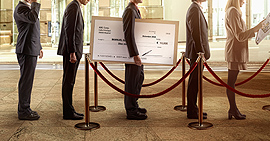Characteristics
Cheques are used to make payments without having to use cash. A cheque may also be used to withdraw money from a bank account, in which case the drawer and payee are the same person.
Main characteristic of cheques:
- It is an instrument payable upon presentation and will be honoured as long as there are available funds in the account, even when it is presented before the issue date.
- If the funds in the cheque drawer's account are insufficient to cover the whole amount, the bank must pay it in part.
- To encash a cheque in Spain, it must be presented within the following deadlines:
- 15 days from the issue date for cheques issued or payable in Spain
- 20 days for cheques issued in other European countries
- 60 days for cheques issued in the rest of the world
- After these deadlines, banks may be willing to cash a cheque, provided it has not beent cancelled, and depending on factors such as the availability of funds in the account or the length of time that has elapsed.
In order for the cheque to be valid, it must include:
- The word “cheque”
- The order to pay the stated amount
- The name of thebank that is to make the payment (drawee)
- The signature of the person issuing the cheque (drawer)
Other non-mandatory requirements:
- Issue date. Cheques issued with no date are valid as the payee can include it when needed. Post-dated and pre-dated cheques, i.e. cheques dated before or after the issue date, are also valid. It is possible to encash a cheque on a date other than the stated date.
- The places of issue and encashment.
- The payee´s name. If no name is stated, the cheque is considered a bearer cheque.
-
The drawer of a cheque has the following rights:
- The bank must totally or partially pay the cheque if there are sufficient funds in the drawer’s account.
- Once the presentation period expires, drawers may cancel the cheque, stopping the bank from making the payment.
The payee or bearer of a cheque has the following rights:
- The cheque can be endorsed to a third party, unless stated otherwise (i.e. “not negotiable” is written or printed on the cheque).
- Presenting the cheque to cash it.
- Claiming or proving the non-payment of a cheque when it has been returned despite being presented in due time. You are also entitled to claim the payment of the cheque.
- Receiving the corresponding settlement document, when the cheque has been deposited in a bank account.
-
The drawer of a cheque has the following obligations:
- Ensuring sufficient funds are available in the account.
- Storing the chequebook safely.
As payee or bearer, the following obligations apply:
- Paying the corresponding bank fees.
- Handing over the cheque to the bank upon receipt of the amount payable.
- It is advisable to cash or deposit a cheque within the established presentation period.
FREQUENTLY ASKED QUESTIONS
Do cheques expire?
Read answeraboutDo cheques expire?
How long does it take for a cheque to clear
Read answeraboutHow long does it take for a cheque to clear



